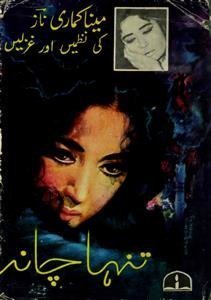 For any query/comment related to this ebook, please contact us at haidar.ali@rekhta.org
For any query/comment related to this ebook, please contact us at haidar.ali@rekhta.org
About The Book
لوگ مینا کماری کو ایک پر کشش فلمی اداکارہ کی حیثیت سے جانتے ہیں، لیکن وہ ایک اچھی شاعرہ بھی تھیں۔ مینا کماری کی شاعری درد اور یاسیت کی چادر میں لپٹی ہوئی ہے۔ مینا کماری کی ذاتی زندگی بھی کسی داستانِ الم سے کم نہ تھی۔ ان کے اشعار سے اُداسیوں کی مہک آتی ہے لیکن اس کے ساتھ ساتھ بعض تجربات کو بڑے لطیف پیرائے میں بیان کیا گیا ہے۔ان کی وصیت کے مطابق ان کا شعری مجموعہ گلزار کے حوالے کیا گیا جنہوں نے ان کی آخری خواہش کے مطابق چھاپ کر "تنہا چاند” کے نام سے شائع کر دیا۔ مینا کماری نے واقعی تنہا چاند کے مانند زندگی گزاری،کرنیں بکھیرتی رہیں اور خود تنہا چاند کی طرح جلتی رہیں۔ زیر نظر کتاب کے دوسرے ہی صفحہ پر اس مجموعہ کے بارے میں چند سطریں کچھ اس طرح کی ہیں "خون دل سے لکھی ہوئی نظمیں، آہوں اور سسکیوں سے ترتیب دی ہوئی غزلیں،کاجل بھرے آنسوؤں کی روشنائی سے بنی ہوئی تصویروں کے ساتھ شائع کی گئی ہیں۔"
About The Author
The real name of Meena Kumari was Mahjabeen Bano. After her first movie ‘Leather Face’, Vijay Bhatt changed her name and proposed to her three names to choose from—Prabha, Kamla and Meena. She eventually became ‘Meena Kumari’, although her nickname was Manju. She had two other sisters, one of whom got married to the famous actor Mahmood who is well-renowned for his comic roles. Starting her acting career as a child artist, she rose to unprecedented heights of fame and acclaim in her thirty-three years long career. She became the first female actor to have won a Filmfare Award. The movie ‘Baiju Bawra’ that got her this award also proved to be the first major film among many others that were to bring her tremendous success.
Meena Kumari was an avid reader and a big fan of Mirza Ghalib at that. She owned an impressive collection of books in her personal library including all the works of Ghalib. At the sets of the movie ‘Benazir’, director Bimal Roy’s assistant got Meena introduced to the famous writer and poet Gulzar. This opened to her new avenues and she started writing poetry choosing ‘Naaz’ as her pen-name. A collection of her poetry was published under the title Tanha Chand.
Her life and prosperous career were marred by heavy drinking, troubled relationships and subsequent deterioration of her health. The cause of her death on March 31, 1972 was liver cirrhosis. She is often cited by media and literary sources as "The Tragedy Queen", for her regular representation of grief-stricken and dramatic roles in her films and also for her real-life story.
 For any query/comment related to this ebook, please contact us at haidar.ali@rekhta.org
For any query/comment related to this ebook, please contact us at haidar.ali@rekhta.org
Write a Review
Jashn-e-Rekhta 10th Edition | 5-6-7 December Get Tickets Here











